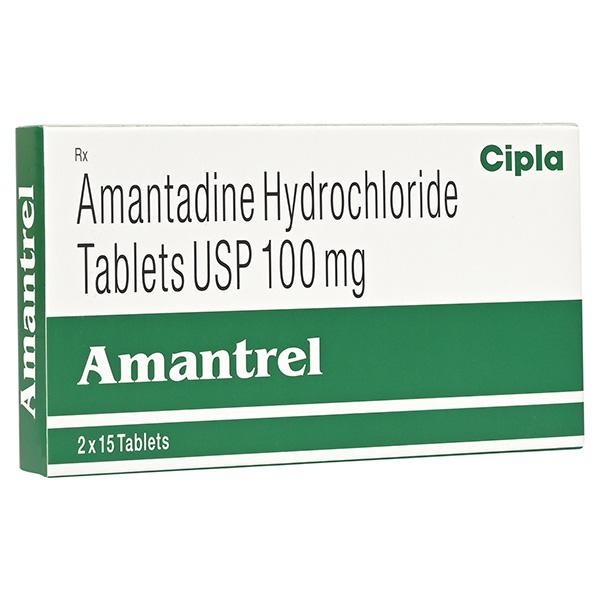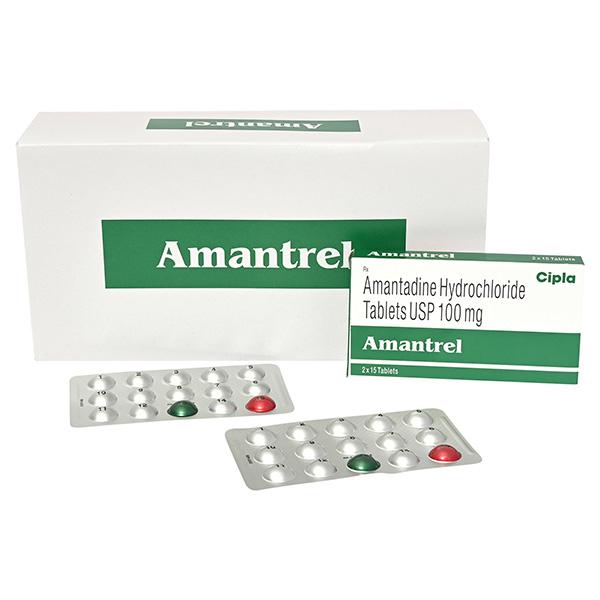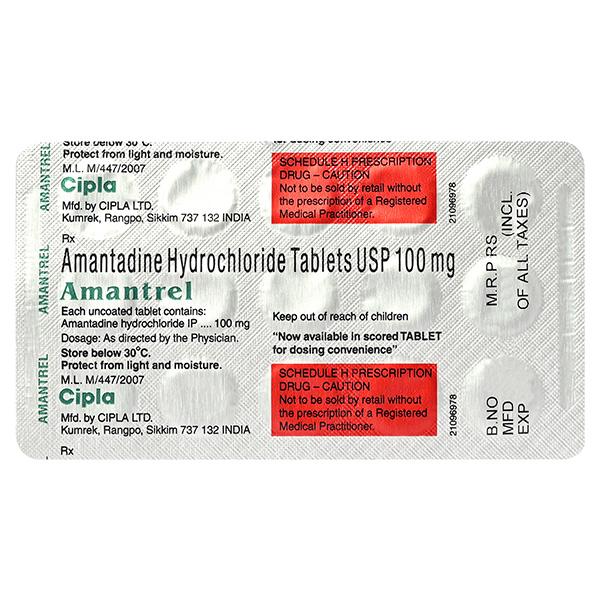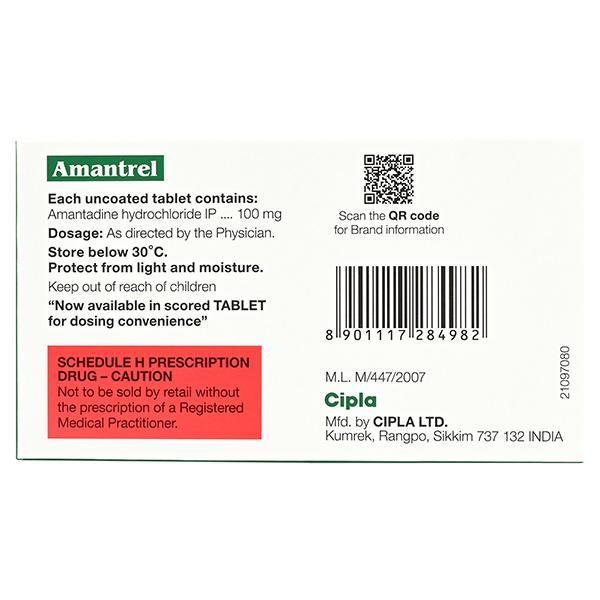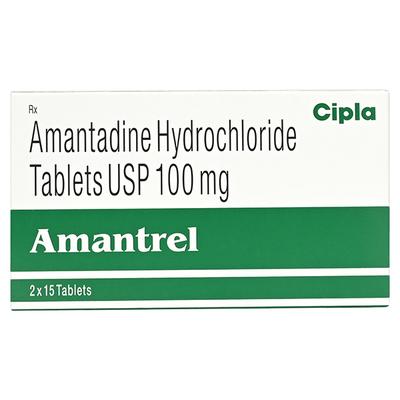

Netmeds First Membership
Quick Links
Introduction About AMANTREL 100MG TABLET
Amantrel 100mg contains Amantadine Hydrochloride, commonly used in Neurological health management and for certain viral infections as advised by healthcare professionals. It is often recommended as part of supportive care for specific Parkinsonian conditions and selected viral episodes, under guidance.
Take Amantrel 100mg as advised by your physician. Swallow the medicine with a glass of water. Do not crush or chew the medicine. Your doctor will decide the correct dose and duration for you depending upon your age, body weight and disease condition.
Before taking Amantrel 100mg, inform your doctor if you have any problems related to kidney, liver or heart, any mental illness like schizophrenia (mental disorder) or dementia (memory loss) and glaucoma (increased pressure in the eyes).
Amantrel 100mg is not recommended to be taken while you are pregnant or breast feeding. It is not recommended for use in newborn and infants (below 1 year of age) and it should be used with caution in elderly patients (who are 65 years of age or older).
The most common side effects of taking Amantrel 100mg are loss of appetite, tiredness, dryness in the mouth, constipation and nausea or vomiting. Consult your doctor if any of the side effects worsen.
Uses Of AMANTREL 100MG TABLET
Used for:
- Neurological health management and for certain viral infections
- Supportive care for specific Parkinsonian conditions
Key Highlights of Amantrel 100mg
- Each tablet contains 100 mg of Amantadine Hydrochloride
- May be prescribed as part of care plans involving Parkinson’s-like symptoms or select viral concerns
- Backed by clinical data on neurological function modulation and antiviral activity
- Usually taken once or twice daily with or without food, based on medical advice
Benefits of AMANTREL 100MG TABLET
- Amantrel 100mg Tablet (Amantadine Hydrochloride) is often incorporated into medical care plans to support individuals experiencing specific neurological challenges. It is primarily used in patients diagnosed with Parkinsonism or movement-related concerns linked to medication use, and may also be considered in certain cases of post-viral fatigue under medical supervision. Its mechanism is believed to support dopamine balance and help regulate abnormal nerve signals, which can contribute to better control of body stiffness, slowness, and fatigue
- For individuals managing long-term neurological conditions, Amantrel may be part of a broader care routine that includes physiotherapy, diet adjustments, and regular follow-ups with a neurologist
- In some patients, it helps maintain daily function and alertness, particularly in those who experience early fatigue or sluggish movement
- Additionally, Amantrel is sometimes considered in patients recovering from viral illnesses who continue to experience low energy or movement-related symptoms, based on clinical judgment
How AMANTREL 100MG TABLET Works
Amantadine is known to influence dopamine activity and certain viral replication pathways. This dual mechanism helps support brain signaling and viral defense mechanisms as guided by clinical practice. Its role in neurological wellness and immune engagement makes it a unique component in long-term or seasonal care plans.
What Happens in the Body After Taking Amantrel?
- Once ingested, Amantrel 100mg Tablet is absorbed through the gastrointestinal tract and enters the bloodstream. It reaches the brain and influences the levels of dopamine, a key chemical messenger that helps regulate body movement, mood, energy, and attention. This is especially helpful in individuals dealing with neurological conditions where dopamine function is altered.
- Amantrel also acts on the N-Methyl-D-Aspartate (NMDA) receptors in the brain, helping to reduce abnormal nerve excitability. This dual mechanism may help ease muscle rigidity, slow movements, and mental fatigue in some patients. People managing Parkinsonism or post-viral fatigue symptoms may experience gradual improvement in body control and alertness over time, especially when combined with other supportive therapies
- The body processes Amantrel through the kidneys, which is why dosage may be adjusted for elderly individuals or those with reduced kidney function. Some users may begin to feel its effects within a few hours to a few days, but full impact often develops over 1–2 weeks depending on the individual’s response and dosage plan
- It is important to take Amantrel consistently and as advised by a healthcare provider, since its action is closely tied to how it is absorbed and maintained in the body. Sudden changes in dose or stopping without guidance can affect the body’s neurological balance and may lead to unwanted effects.
How to use AMANTREL 100MG TABLET
Take Amantrel 100mg as advised by your physician. Swallow the medicine with a glass of water. Do not crush or chew the medicine. Your doctor will decide the correct dose and duration for you depending upon your age, body weight and disease condition.
1. Recommended Dosage of Amantrel 100mg
- The dosage of Amantrel 100mg Tablet varies depending on the individual’s age, kidney function, and medical condition
- The usual starting dose is 100 mg once or twice daily, with adjustments made by the prescribing physician based on clinical response and tolerance
- For elderly patients or those with reduced kidney function, a lower dose or extended dosing interval may be recommended to minimize the risk of side effects such as confusion, dizziness, or swelling
- It is advised to take Amantrel at the same time each day, preferably with food or a light snack to reduce the chance of stomach upset
- Avoid taking it late in the evening, especially if you are sensitive to sleep disturbances or increased alertness, as the medicine can mildly stimulate the nervous system
2. Usage Advice
- Always follow the dosage schedule provided by your healthcare provider
- Stay hydrated and avoid abrupt discontinuation without medical guidance
- Report any changes in mood, behavior, or vision promptly
What if I forgot to take AMANTREL 100MG TABLET
- If you miss a dose of Amantrel 100mg Tablet, take it as soon as you remember, unless it is almost time for your next scheduled dose. In that case, skip the missed dose and continue with your regular dosing schedule
- Do not double the doses to make up for the missed one, as this can increase the risk of side effects such as agitation, dizziness, or mood changes
- Set a daily reminder or use a medication tracker app to help maintain consistency, especially if you are on a long-term neurological care plan
- If you frequently forget doses or are unsure about how to proceed after a missed dose, it is best to consult your healthcare provider for personalized guidance
Overdose
If you or anyone else accidentally take too much of consult with your doctor immediately or visit the nearby hospital
Side Effects Of AMANTREL 100MG TABLET
Common
- loss of appetite
- tiredness
- dryness in the mouth
- constipation
- nausea or vomiting
When to consult a doctor?
- dizziness
- light headedness or fainting
- convulsions
- impulse control disorder
How To Manage Side Effects
Constipation
- Eat plenty of fiber rich foods such as fresh fruits, vegetables, and cereals and drink plenty of water
- Exercise more regularly
Dry Mouth
- Sip water regularly and other sugar free liquids
- Do not use mouthwashes that contain alcohol because they can make your mouth dry, use mouthwash that is used only for dry mouth
- Limit your caffeine intake
Nausea And Vomiting
- Stick to simple meals and avoid eating oily rich, fried or spicy foods
- Do not lie down or sleep immediately after eating
Tiredness
- Drink plenty of fluid and eat balanced diet and frequent meals
- Do regular minimal exercise and follow regular sleep schedule
Warning & Precautions
Pregnancy
ContraindicatedAmantrel 100mg is not recommended for use if you are pregnant women.
Breastfeeding
ContraindicatedAmantrel 100mg is not recommended for use while you are breast feeding as it may pass through breast milk and could harm the baby.
Driving and Using Machines
Use with CautionDo not drive or use machines after taking Amantrel 100mg as it may cause side effects such as dizziness or visual disturbances that may affect your ability to drive and use machines.
Alcohol
ContraindicatedDo not drink alcohol while taking Amantrel 100mg as it may cause dizziness, confusion, light headedness and low blood pressure (especially when standing up from sitting or lying position).
Kidney
Consult your doctorAmantrel 100mg should not be used in patients with serious kidney disease. It should be used with caution in patients with kidney disease.
Liver
Use with CautionAmantrel 100mg should be taken with caution if you have any liver disease.
Allergy
ContraindicatedDo not take Amantrel 100mg if you are allergic to Amantadine or any other ingredients of this medicine.
Heart Disease
Use with CautionAmantrel 100mg should be taken with caution in patients with a history of disease involving the heart and blood vessels or suffering from heart problems or heart failure (which causes shortness of breath or ankle swelling).
Use In Pediatrics
Consult your doctorAmantrel 100mg Tablet may be considered for use in pediatric patients, but only under specialist medical supervision. Its use in children is typically limited and based on specific conditions. It is not routinely used in infants or very young children, unless clearly indicated by a doctor.
Use In Geriatrics
Use with CautionAmantrel 100mg should be used with caution in elderly patients who are 65 years of age or older.
Other Warnings for AMANTREL 100MG TABLET
Before taking Amantrel 100mg, inform your doctor if you:
- have any mental illness (such as schizophrenia or dementia)
- have increased eye pressure (glaucoma)
Who should not take [GBNKEYWORD
Amantrel 100mg is not recommended for use if you:
- have convulsions
- ever had ulcer in the stomach or small intestine
Safety Advice
Discuss with your doctor if you:
- have kidney, liver, or heart concerns
- are pregnant, planning pregnancy, or breastfeeding
- are on medications for psychiatric, neurological, or immune conditions
Diet and Lifestyle Advice
1. What to eat while on Amantrel
- Hydration is Key: Drink adequate water throughout the day to support kidney health, especially since Amantadine is cleared via the kidneys.
- Fiber-Rich Foods: Include fresh fruits, vegetables, and whole grains to maintain gut health and manage occasional constipation, which some users may experience.
- Balanced Protein Intake: Moderate amounts of protein (from eggs, dal, or lean meats) are ideal. Avoid very high-protein meals close to your medication timing unless advised otherwise.
- Limit Excess Caffeine or Alcohol: These may worsen restlessness or dizziness, symptoms that can rarely occur with Amantrel
- Avoid OTC Antihistamines or Cold Medications without asking your doctor, as some may intensify nervous system effects.
2. Lifestyle Habits That Help
- Stay Physically Active: Gentle activities like walking, stretching can improve flexibility and muscle strength, especially when mobility is a concern
- Set a Daily Routine: Taking Amantrel at the same time every day supports consistent absorption and effect. Use reminders or a weekly pill organizer if needed.
- Monitor for Mental Alertness: If you notice mood changes, vivid dreams, or sleep disruptions, share these with your healthcare provider as these are manageable but important to monitor
- Avoid Driving Initially: Until you know how the medicine affects your coordination or alertness, especially in the first few days of use.
3. Mental Wellness Matters
- Including calming routines like meditation, music, or time outdoors can complement your medical care and reduce nervous tension or fatigue associated with neurological conditions.
Interactions
Amantrel may interact with:
1. Medicine Category: Anticholinergics
Example: Benztropine
Potential Concern: May enhance side effects such as dry mouth or confusion
2. Medicine Category: Diuretics
Example: Furosemide
Potential Concern: Risk of amantadine toxicity due to reduced clearance
3. Medicine Category: Antivirals or Dopaminergic Agents
Example: Levodopa
Potential Concern: Enhanced neurological effects; monitor closely
Synopsis
| Drug | : | Amantadine |
| Pharmacological Category | : | Dopamine agonist/Antiviral agent |
| Therapeutic Indication | : | Parkinson’s disease, Influenza A virus, Shingles, Drug-induced extrapyramidal Reactions |
| Dosage Forms | : | Tablet, Capsule |
More Information
Amantadine vs Levodopa for Parkinson’s
|
Feature |
Amantadine (Amantrel 100mg) |
Levodopa (with Carbidopa) |
|
Primary Use |
Support for fatigue, tremors, slowness in early or adjunct care |
Core medicine for managing motor symptoms in Parkinson’s |
|
Mechanism of Action |
Enhances dopamine release and blocks NMDA receptors |
Converts to dopamine in the brain to restore dopamine levels |
|
Onset of Effect |
Slower onset; may take days to weeks |
Usually noticeable within hours to days |
|
Use Stage |
Often used in early-stage Parkinsonism or drug-induced symptoms |
Typically used in moderate to advanced Parkinson’s disease |
|
Additional Uses |
Fatigue management, drug-induced movement concerns |
Mainly motor symptom control in Parkinson’s |
|
Common Side Effects |
Dizziness, dry mouth, swelling, confusion (in elderly patients) |
Involuntary movements, nausea, BP changes, wearing-off effects |
|
Dosage Frequency |
Once or twice daily, based on condition |
Multiple times daily, usually taken with meals |
|
Long-Term Tolerance |
May lead to reduced benefit over time in some individuals |
Effectiveness may reduce due to "wearing off" or dyskinesia |
|
Combination Use |
May be combined with Levodopa or other dopaminergic medicines |
Often combined with Carbidopa to improve absorption and tolerance |
Understanding Dopamine Support in Parkinson’s Care
- Dopamine is a chemical messenger that plays a vital role in coordinating body movement, attention, and emotional responses
- In Parkinson’s-related conditions, there is a progressive decrease in the natural production of dopamine in certain areas of the brain. This leads to slowness in movement, muscle stiffness, tremors, and fatigue and symptoms that vary from person to person
- Medicines like Amantrel 100mg (Amantadine) and Levodopa combinations are often included in a patient’s plan to support dopamine balance. These medicines work by enhancing the brain’s response to dopamine, boosting its release, or supplementing dopamine-like activity
- While Levodopa directly converts to dopamine inside the brain, Amantadine supports this balance by influencing receptors involved in motor control and modulating brain signals that affect fatigue and coordination
- Dopamine support is not one-size-fits-all. Depending on a person’s age, stage of condition, kidney function, and other health needs, the selection and dosage of medicines may vary
- Incorporating lifestyle steps such as consistent medication timing, gentle physical activity, and adequate hydration can further support overall well-being in people receiving dopamine-modulating support
FAQs About AMANTREL 100MG TABLET
Q: Can I stop taking Amantrel 100mg if the symptoms get better?
A: Do not stop taking Amantrel 100mg suddenly even if your symptoms get better, without the advice of your doctor. If you stop taking Amantrel 100mg, suddenly you may experience fever, sweating, rapid heartbeat, muscle stiffness (difficulty in movement) and loss of bladder control (resulting in sudden urge to pass water).
Q: Can I drink alcohol while taking Amantrel 100mg?
A: No, do not drink alcohol while taking Amantrel 100mg as it may cause dizziness, confusion, light headedness and low blood pressure (especially when standing up from sitting or lying position).
Q: Can Amantrel 100mg be used in elderly patients?
A: Amantrel 100mg should be used with caution in elderly patients who are 65 years of age or older, and your doctor may initiate the management with the lowest effective dose in patients with kidney impairment, heart failure, peripheral oedema (swelling of legs or hands) or low blood pressure (especially when standing up from sitting or lying position).
Q: Is Amantrel 100mg safe to use during breast-feeding?
A: Amantrel 100mg is not recommended to be taken while you are breast feeding as it may pass through breast milk and could harm the baby.
Q: Can Amantrel 100mg be used in patients with kidney disease?
A: Amantrel 100mg should not be used in patients with serious kidney disease. It should be used with caution in patients with kidney disease. Your doctor may adjust the dose based on functioning of the kidney.
Q: Can Amantrel be used for influenza support?
A: Amantadine has been studied for its antiviral properties in certain strains. Your doctor will decide its suitability based on current protocols and resistance patterns.
Q: Is Amantrel 100mg safe for long-term use?
A: Long-term use may be considered under medical supervision for specific neurological needs. Regular check-ups are essential to assess progress and side effects.
Q: Can I drive or operate machinery after taking Amantrel 100mg?
A: Amantadine may cause dizziness or blurred vision in some individuals. It is advised to understand your body’s response before engaging in activities that require full alertness.
Q: Where to buy Amantrel 100mg Tablet 15's Online?
A: Looking for a convenient way to order Amantrel 100mg Tablet. Shop securely from Netmeds with verified sourcing, proper storage, and fast delivery across India.
Q: Can I take Amantrel during pregnancy?
A: Amantrel 100mg Tablet should only be used during pregnancy if clearly advised by a healthcare professional. It is not routinely recommended for use in pregnant individuals unless the expected benefit clearly outweighs potential concerns. Before using this medicine, it is important to discuss your pregnancy status or plans with your doctor. Understand that Amantadine has shown effects in animal studies, so careful assessment is essential before prescribing during human pregnancy.
Q: Does Amantrel cause sleep issues?
A: Yes, Amantrel 100mg Tablet may sometimes affect sleep in certain individuals. Some people report difficulty falling asleep, vivid dreams, or feeling more alert than usual after starting the medicine. This is more likely when the tablet is taken late in the day. To support better rest take Amantrel earlier in the day, preferably in the morning or afternoon, unless your doctor advises otherwise. Avoid caffeine or screen time before bed to minimize stimulation. Keep a sleep diary if you notice changes in your sleep patterns.
References
1. Bertram G. Katzung, Pharmacologic Management of Parkinsonism & Other Movement disorders, Basic and clinical pharmacology, Fourteenth Edition. 2015. Page- 501.
2. K.D. Tripathi. Drugs acting on central nervous system. Essentials of medical pharmacology. Sixth edition. 2013. Page- 421.
3. Chang C, Ramphul K. NIH National Library of Medicine; National centre for biotechnology information. [Revised in June 2022] [Accessed on 28th July 2025] ![]()
4. Sheik Hosenbocus, Raj Chahal. Amantadine: a review of use in child and adolescent psychiatry. NIH National Library of Medicine; National centre for biotechnology information. PubMed.gov. February 2013. [Accessed on 28th July 2025] 
5. Upsher-Smith Laboratories. NIH National Library of Medicine; National centre for biotechnology information. Dailymed. [Revised in May 2020] [Accessed on 28th July 2025] 
6. Chanelle Medical. Electronic Medicines Compendium (EMC). [Revised in January 2021] [Accessed on 28th July 2025] 











